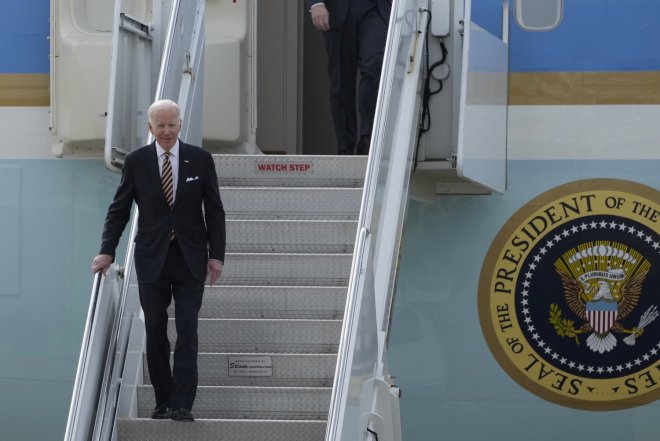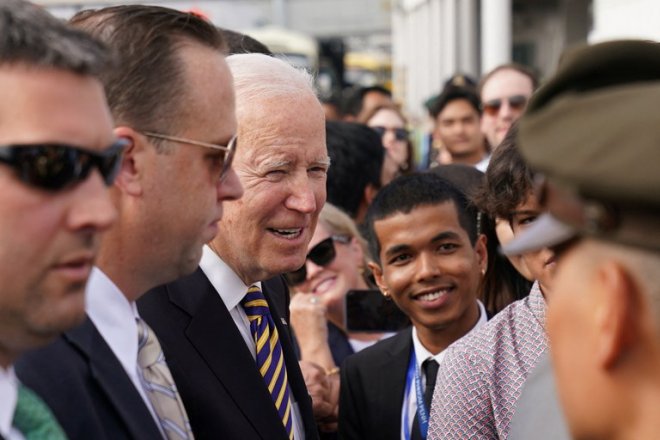
A day after attending the COP27 Climate Conference in Egypt, U.S. President Joe Biden flew into Cambodia Saturday to attend an afternoon summit with leaders of the Association of Southeast Asian Nations, seeking to underscore his administration’s commitment to a region where the U.S. and China vie for influence.
At the ASEAN-U.S. meeting Biden will “reaffirm the United States’ strong support for ASEAN centrality and build on the achievements of the historic U.S.-ASEAN Special Summit that was held in Washington, D.C., earlier this year,” according to White House Press Secretary Karine Jean-Pierre.
“He will underscore U.S. support for the ASEAN-led regional architecture in the Indo-Pacific and discuss opportunities to ensure a free and open Indo-Pacific that is more connected, more prosperous, more secure, and more resilient,” she said.
The key to that is the U.S. government’s plan for increased engagement with the region through the Indo-Pacific Economic Partnership (IPEF). The State Department says the U.S. has already announced nearly $250 million in new U.S.-ASEAN initiatives in the past year to boost economic growth, address health issues following the COVID-19 pandemic, and tackle climate change.
“This region is essential to maintaining a free and open Indo-Pacific and is directly connected to the future of our combined 1 billion people,” said U.S. Ambassador to ASEAN Yohannes Abraham in a pre-summit briefing.
ASEAN is already America’s fourth-largest trading partner and the U.S. is the biggest investor in the region’s economies, he said.
Whether the members of ASEAN will be impressed by what the U.S. has to offer is another matter.
"I don’t think ASEAN states are much sold on IPEF. It contains parts that are anathema to them and yet isn"t really a trade deal, and does little to actually further regional economic integration. It"s a fairly weak package overall," said Joshua Kurlantzick, senior fellow for Southeast Asia at the Council on Foreign Relations.
"China is already by far the region"s dominant economy and trade partner and the U.S. isn"t going to materially change that. Southeast Asian states are stuck with China as their dominant economic partner but — for some Southeast Asian states — [there is] a desire to build closer strategic ties with the U.S. But the U.S. is not going to now replace China as the region"s dominant trade partner."
 U.S. President Joe Biden greets embassy staff and families at the Phnom Penh International Airport as he arrives to attend the 2022 ASEAN summit in Phnom Penh, Cambodia, November 12, 2022.
U.S. President Joe Biden greets embassy staff and families at the Phnom Penh International Airport as he arrives to attend the 2022 ASEAN summit in Phnom Penh, Cambodia, November 12, 2022.
CREDIT: Reuters/Kevin Lamarque
Biden will also join ASEAN leaders in discussing Myanmar where a February 2021 military coup against an elected government has spawned a deepening civil conflict. On Friday, leaders of nine of the 10 members of the bloc – Myanmar junta leader Senior Gen. Min Aung Hlaing the absentee – took a tougher line toward ASEAN’s peace plan, the Five Point Consensus, calling for measurable progress toward its goals that include restoring democracy and delivering humanitarian aid.
“The President will use this opportunity to discuss how we can coordinate more closely to continue to impose costs and raise pressure on the junta in Naypyidaw as they continue to take steps that repress and oppress their citizenry and move that country further away rather than closer to the democratic path it was on before the coup,” National Security Advisor Jake Sullivan told reporters aboard Air Force One.
Ahead of the ASEAN-U.S. summit, Biden is holding a bilateral meeting in Phnom Penh with Cambodian Prime Minister Hun Sen. He’s also meeting the Japanese prime minister and South Korean president both separately and together. Those talks are likely to focus on North Korea’s recent barrage of missiles fired into the seas off the Korean peninsula — including one that passed over Japan. North Korea is also reported to be planning a nuclear test.
On Sunday, Biden attends the East Asia Summit where he plans to discuss ways to end the Russian invasion of Ukraine and limit the global impact of the war in terms of fuel and grain shortages that are fueling global inflation.
Biden then heads to the Indonesian island of Bali to attend the Group of 20 leaders’ summit.
Ahead of the G20, on Monday Biden will meet with China’s leader Xi Jinping. It will be their first face-to-face talks since Biden took office nearly two years ago.
Sullivan said that Biden will tell Xi that if North Korea continues on its current path, it will lead to an enhanced U.S. military presence in the region.
The meeting between the two leaders comes as Xi begins a third term in office after consolidating his domination of the ruling Chinese Communist Party at a National Congress despite mounting domestic problems inside China.
For his part, Biden is entering this Asian summit season after his Democrat party’s slim grip on the U.S. Congress slipped after mid-term elections.
Analysts say the meeting with Xi is likely to focus on keeping open lines of communication and finding areas to cooperate, as well addressing contentious issues such as both countries’ war games in the region, Taiwan and North Korea.
